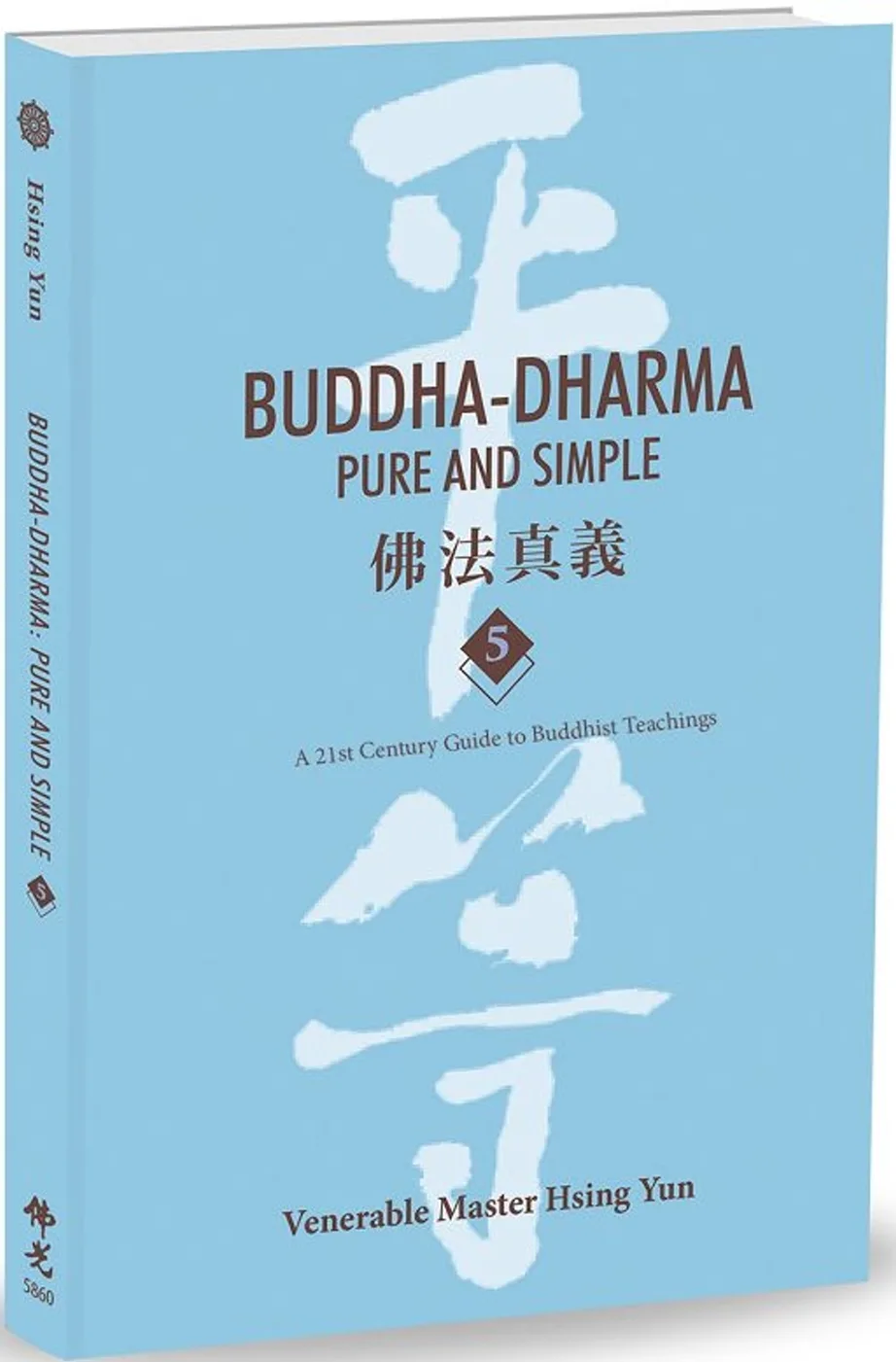|
|
|
Buddha-Dharma: Pure and Simple 5:佛法真義
|

|

沒有庫存
訂購需時10-14天
|
|
|
|

|
|
9789574576456 | |
|

|
|
Venerable Master Hsing Yun | |
|

|
|
佛光 | |
|

|
|
2022年11月18日
| |
|

|
|
83.00 元
| |
|

|
|
HK$ 74.7
|
|
|
|
|

| |
|
|
|
|
| |
|
|
詳
細
資
料
|
ISBN:9789574576456叢書系列:佛光文選規格:平裝 / 200頁 / 14 x 21 x 1 cm / 普通級 / 單色印刷 / 初版出版地:台灣
佛光文選
|
|
分
類
|
宗教命理 > 佛教 > 佛教經典/解說 |
同
類
書
推
薦
|
|
|
內
容
簡
介
|
In today’s Buddhist sphere, numerous claims have been made on what the Buddha has taught. However, were these teachings truly spoken by the Buddha? The Buddha-Dharma: Pure and Simple series is an exploration of over 300 topics, where Venerable Master Hsing Yun clarifies the Buddha’s teachings in a way that is accessible and relevant to modern readers. Erroneous Buddhist views should be corrected, the true meaning of the Buddha must be preserved to hold true to the original intents of the Buddha.
All Buddhist practice begins with right view, for it is the compass that points toward the true path of cultivation. This fifth installment continues laying the groundwork of this foundation by addressing age-old misconceptions. Covering a wide range of social issues from the perspective of the Buddha-Dharma, Venerable Master offers readers a practical but profound approach to Buddhist practice in daily life.
?
|
|
目
錄
|
About Venerable Master Hsing Yun
Translator’s Introduction
Preface
1.?? ?Did the Buddha Ever Express Anger?
2.?? ?Unhuman
3.?? ?Skillful Teachings
4.?? ?Ten Hardships of the Buddha
5.?? ?A Sesame Seed and a Grain of Wheat
6.?? ?Where Can Mentors Be Found?
7.?? ?Dharma Friend
8.?? ?Where Does One Abide?
9.?? ?Buddha Selection Court
10.?? ?Renunciation
11.?? ?Siksamana
12.?? ?Does Arthats Commit Killing, Stealing, and Sensual Conduct?
13.?? ?Haiqing and Changshan
14.?? ?Four Kinds of Comportment
15.?? ?To Speak Gently and Steadily
16.?? ?Joined Palms
17.?? ?Prostration
18.?? ?Spiritual Retreat
19.?? ?Alms Procession
20.?? ?No Eating After Noon
21.?? ?Formal Meal
22.?? ?The Benefits of a Vegetarian Diet
23.?? ?Making Offerings
24.?? ?The Essence of Offering to the Sangha
25.?? ?The Merits of Rejoicing in Others’ Virtues
26.?? ?Meritorious Blessings
27.?? ?Supernatural Powers
28.?? ?Visitor Administrator
29.?? ?Sickbay
30.?? ?Roaming in Jianghu
31.?? ?Cloud and Water Practices
32.?? ?Dharma Protector
33.?? ?Light Offering
34.?? ?First Incense, First Bell, and First Drum
35.?? ?Consecration Ceremony
36.?? ?Rebirth
37.?? ?Where are Heaven and Hell Found?
38.?? ?Deities
39.?? ?Tudigong
40.?? ?Ghosts
41.?? ?Original and manifested bodies
42.?? ?Avalokitesvara
43.?? ?Mahasattva
44.?? ?Unreasonableness and Unfeelingness
45.?? ?Was the Sixth Patriarch Illiterate?
46.?? ?Recognizing Chan Master Shenxiu
47.?? ?Sudden and Gradual Enlightenment Are As Equals
48.?? ?Bodhisattva and Volunteer
49.?? ?Modern-day Bodhisattvas
50.?? ?Zhao Puchu Bodhisattva
51.?? ?Yang Renshan Bodhisattva
52.?? ?Caigu and Shigu
53.?? ?Young Boy and Young Girl
54.?? ?Being in a Mist
55.?? ?Three Meetings Beneath the Dragon-Flower Tree ?
?
|
|
序
|
Translator’s Introduction
The first two volumes of Buddha-Dharma: Pure and Simple focus on topics of faith and doctrine, while the third and fourth volumes explore the more practical aspects of Buddhist practice. Upon opening this volume, readers will discover a list of seemingly unconnected topics ranging from the Buddhas stories (”Did the Buddha Ever Express Anger?”, “Ten Hardships of the Buddha”), to specific aspects of cultivation (“Four Kinds of Comportment,” “Joined Palms,” “No Eating After Noon”), as well as Chinese folk religion (“Deities,” “Tudigong,” “Caigu and Shigu”).
What this volume offers is a journey through the history of Buddhism, beginning from the founder himself to Buddhist practitioners of the 21st century, and traditional practices originated from India to modern endeavors assisted by advanced technology. As Buddhism passed down from one generation to the next, many aspects were altered due to cultural differences, and new practices were added. The original spirit of the Buddhas teaching was lost, forgotten in the maze of time. Venerable Master’s critiques and insights brush away the cobwebs that clung to these so-called Buddhist traditions to reveal the original intent of the Buddha, and how we can better integrate the Buddha-Dharma into todays culture, society, and world.
Given some topics can be culture-specific, some terms are transliterated rather than translated. This is done for a few reasons: first, when the Chinese phrase has no exact equivalent in English. Second, to retain the rich meaning of the Chinese context. Third, when the term is also used as a wordplay. To aid the reading process, the Chinese characters and the literal meaning of these transliterations are provided in the article, and additional explanations can be found in Notes.
Buddhism has a rich history, diverse traditions, and multifaceted practices, but its core teachings remain the purification of our bodies and minds and the enhancement of moral ethics. It also teaches us to be kinder and more compassionate people and strive for a life of liberation and perfect ease. The personal examples of the Buddha and generations of Buddhist practitioners serve as role models and inspiration.
?
|
|
|
書
評
|
|
|
|

